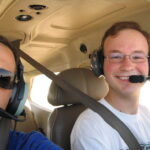
Embarking on the journey to become a pilot is thrilling. The roar of engines, the sweep of the horizon, and the freedom of the skies are within reach. But before the clouds beckon, there’s groundwork to be done. Online ground school training is your ticket to understanding the skies before you soar through them.
Your First Step to the Skies: Essential Online Ground School Training for Aspiring Pilots
Imagine sitting in the cockpit, hands poised on the controls, ready to take off. That dream starts here, on the ground, with a robust online training program designed to equip you with the knowledge you need to become a confident, competent pilot. Online ground school is the foundation of your flight training, offering flexibility and comprehensive education to ensure you’re prepared for the skies.
What Is Online Ground School?
Online ground school is a structured program that provides the theoretical knowledge every pilot needs. Think of it as the classroom portion of your pilot training, accessible from anywhere, at any time. It covers everything from the principles of flight to navigation, weather, regulations, and more. This training is crucial; it prepares you for the FAA knowledge test and lays the groundwork for your in-flight training.
- Learn the language of aviation with ease
- Master the principles of aerodynamics from your living room
- Understand weather patterns and how they affect your flight
- Get to grips with navigation techniques using the latest technology
- Know the FAA regulations like the back of your hand
- Prepare thoroughly for the FAA knowledge test
- Build a strong foundation for safe and efficient flying
The Building Blocks of Flight Theory
Flight theory is the cornerstone of a pilot’s education. It’s not just about how planes fly, but why. By grasping the basics of aerodynamics, aircraft systems, and performance, you’re not just memorizing facts; you’re understanding the forces at play when you’re thousands of feet in the air. Online ground school breaks down these complex concepts into digestible lessons, ensuring you have a firm grasp on the essentials.
Choosing the Right Online Ground School
With a sea of options, selecting the right online ground school can seem daunting. You want a program that’s not just informative, but engaging and tailored to your learning style. Look for schools with interactive modules, comprehensive resources, and support from experienced instructors. Your choice will shape your future in aviation, so take the time to choose wisely.
Accreditation and Recognition
Accreditation is your assurance of quality. It means the program meets certain educational standards and is recognized by aviation authorities. When a school is accredited, it signals that its curriculum is up to par, its instructors are qualified, and it’s committed to your success. Always check for accreditation before enrolling to ensure your efforts are respected and recognized.
Detailed Course Content Review
What’s inside the course matters. A good online ground school will offer a curriculum that’s both broad and deep, covering every topic you’ll need to know as a pilot. Look for detailed outlines of each module and check if the school provides additional resources like practice exams and one-on-one support. The more comprehensive the content, the better prepared you’ll be for your FAA exam and beyond.
Understanding Ground School Curriculum
Ground school curriculum is vast, but don’t let that intimidate you. It’s structured to guide you through each subject methodically. From the basics of aircraft operations to the nuances of cross-country flight planning, the curriculum is designed to build your knowledge and confidence step by step. By the end of your course, you’ll be ready to take to the skies with a solid understanding of what it takes to be a pilot.
Fundamentals of Aeronautics
Let’s talk about the heart of flying: aeronautics. It’s all about how aircraft are designed, how they operate, and what makes them stay aloft. In your online ground school, you’ll start with the basics: lift, thrust, drag, and weight. These are the four forces that work together to make flight possible. You’ll learn about different aircraft types, how their systems work, and the importance of maintaining them. This knowledge isn’t just for passing tests; it’s for your safety and the safety of your future passengers.
Navigation and Flight Planning Basics
Navigation is your roadmap in the sky. It’s crucial to know where you are, where you’re going, and how to get there safely. Online ground school will introduce you to the tools of the trade: charts, compasses, and navigation systems. You’ll learn how to plan a flight, considering factors like distance, fuel, and alternate airports. Flight planning isn’t just plotting a course; it’s about making smart decisions and being prepared for the unexpected.
Meteorology for Pilots
Weather can be a pilot’s best friend or worst enemy. Understanding meteorology is essential for safe flying. Your online ground school will cover weather patterns, reading forecasts, and recognizing the signs of changing conditions. You’ll learn about winds, clouds, precipitation, and how they affect flight. This knowledge helps you make informed decisions, whether it’s planning a route or knowing when to stay grounded.
Air Regulations and Operational Procedures
Flying isn’t just about skill; it’s about following the rules. Air regulations ensure safety in the skies, and as a pilot, you need to know them inside out. Your ground school will cover the regulations you must follow, from pre-flight procedures to in-flight rules and post-flight requirements. You’ll also learn about the airspace structure and how to operate within it. These rules are your guide to being a responsible and legal aviator.
Communication Skills for Aviation
Clear communication is as vital as a well-tuned engine. In aviation, every word counts. You’ll learn the language of the skies, including standard phraseology, radio procedures, and how to communicate effectively with air traffic control. Good communication prevents misunderstandings and ensures that everyone knows what’s happening. It’s a skill that will serve you well in every flight.
The Benefits of Training Online
Online ground school isn’t just convenient; it’s a game-changer. It brings the classroom to you, providing a wealth of resources right at your fingertips. The benefits are clear: learn at your own pace, revisit complex topics as needed, and fit your training into your busy life. It’s an innovative way to learn, and it’s revolutionizing how pilots are trained.
Flexibility and Accessibility
With online training, you’re no longer bound by classroom schedules. You can study when it suits you, whether that’s early in the morning or late at night. It’s accessible from anywhere with an internet connection, giving you the freedom to learn at home, in a café, or even on the go. This flexibility means you can balance your training with work, family, and other commitments, making the dream of flying more attainable than ever.
Interactive Learning and Resources
Online ground school goes beyond the pages of textbooks. It’s an interactive experience, engaging you with dynamic content that makes learning stick. Videos, animations, and simulations bring concepts to life, while quizzes and practice tests reinforce your understanding. You’re not just reading about flying; you’re experiencing it through every lesson. This immersive approach ensures that when you’re ready to step into the cockpit, you’ll feel like you’ve been there before.
- Engaging video lessons that clarify complex concepts
- Animations that illustrate the mechanics of flight
- Flight simulations for hands-on practice
- Interactive quizzes to test your knowledge
- Practice exams to prepare you for the real test
- Access to a community of fellow student pilots
Preparing for Your FAA Knowledge Test
The FAA knowledge test is a milestone in your pilot training. It’s the culmination of all you’ve learned in ground school, and it’s your chance to prove you have the theoretical foundation to move forward. Preparing for this test is about more than just memorizing facts; it’s about truly understanding the material and being able to apply it. Your online ground school is designed to get you test-ready, with resources tailored to the FAA’s requirements.
Key Topics for Study
When it comes to the FAA knowledge test, there are several key areas you’ll need to focus on. These include aerodynamics, aircraft systems, flight instruments, navigation, regulations, and weather. Each topic is critical to your success as a pilot and will be thoroughly tested. Your online ground school will provide in-depth coverage of these subjects, ensuring you’re well-prepared for every question you might face on test day.
Test-Taking Strategies and Tips
Approaching your FAA knowledge test with the right strategies can make all the difference. First, understand the format of the test and what types of questions to expect. Next, develop a study plan that allows ample time for review. Take practice tests to gauge your readiness and identify areas where you need more focus. During the test, read each question carefully, eliminate wrong answers, and trust your training. Remember, this test isn’t just a hurdle; it’s a way to affirm your knowledge and readiness to fly.
After Online Ground School: What’s Next?
Completing your online ground school is a significant achievement, but it’s just the beginning of your aviation journey. The knowledge you’ve gained sets the stage for the next exciting phase: flight training. This is where you’ll take the theories and principles you’ve learned and apply them in the air. You’ll develop your skills, build your confidence, and work towards your ultimate goal – becoming a certified pilot.
Flight Training Considerations
As you transition from ground school to flight training, there are several factors to consider. Choosing the right flight school is paramount – it should have experienced instructors, a well-maintained fleet, and a culture of safety. You’ll also need to think about the type of aircraft you want to train in and the location of the school. Consider your schedule and budget, as flight training requires both time and financial commitment. But most importantly, choose a training environment where you feel comfortable and supported, as this will greatly enhance your learning experience.
Continued Education and Pilot Resources
Your pilot training doesn’t end with your license. Aviation is a field of continuous learning, and there are always new skills to master and knowledge to gain. Take advantage of advanced courses, safety seminars, and online forums. Stay updated with the latest industry news and regulations. Join a local flying club or pilot association to connect with the aviation community. These resources will not only help you grow as a pilot but also keep your passion for flying alive.
Enrollment and Program Costs
Let’s talk numbers. Investing in your pilot training is a step towards a rewarding career or hobby, but it’s important to understand the costs involved. Online ground school programs vary in price, often depending on the depth of the course and the reputation of the provider. Some courses offer payment plans or bundled options that include additional training materials. Be sure to compare what’s included in the cost, so you can make an informed decision that aligns with your budget and training goals.
Understanding Fee Structures
Fee structures for online ground school programs can be as varied as the aircraft in the sky. Some schools charge a flat fee that gives you access to all course materials, while others might offer a subscription-based model. Additional costs to consider include textbooks, flight simulation software, and exam fees. Always read the fine print to understand exactly what you’re paying for and avoid any surprise charges down the line.
Available Financial Aid and Scholarships
Here’s some good news: financial aid and scholarships are not just for traditional college students. Many aviation organizations and institutions offer scholarships specifically for pilot training. These can significantly reduce the financial burden of your education. Research and apply for scholarships early, as they can be competitive. Some online ground schools may also offer their own financial assistance programs, so don’t hesitate to ask.
Learning Enhancements and Add-ons
Learning to fly is more than just absorbing information; it’s about engaging with the material in a way that sticks. Many online ground schools offer enhancements and add-ons to enrich your learning experience. These can range from interactive webinars to flight simulation tools that give you a taste of flying without leaving the ground. These add-ons can be invaluable in helping you understand complex concepts and build your confidence before you even set foot in an aircraft.
Supplemental Materials and Virtual Simulations
Supplemental materials like interactive charts, detailed aircraft models, and virtual simulations can take your learning to new heights. These tools allow you to practice and visualize the principles of flight in a risk-free environment. Virtual simulations, in particular, can be a game-changer, offering you the chance to ‘fly’ in various conditions and respond to in-flight scenarios. It’s an engaging way to prepare for real-world flying and a fantastic supplement to your ground school studies.
Instructor Support and Community Engagement
Even in an online setting, you’re not alone. Quality online ground schools provide instructor support to answer your questions and guide your learning. Additionally, becoming part of a community of fellow student pilots can be incredibly beneficial. Forums, social media groups, and virtual meet-ups offer opportunities to share experiences, ask for advice, and form study groups. This sense of community not only supports your learning but also connects you with like-minded aviation enthusiasts.
Key Takeaways
- Online ground school is a flexible and comprehensive way to begin your pilot training journey.
- Choosing an accredited program with a rich curriculum is essential for your success.
- Understanding the costs and exploring financial aid options can make pilot training more accessible.
- Learning enhancements such as virtual simulations can significantly benefit your training experience.
- Engaging with instructors and the pilot community can provide additional support and enrich your learning journey.
Frequently Asked Questions (FAQ)
Can I Become a Pilot by Only Attending Online Ground School?
While online ground school is a vital part of your training, it’s only one piece of the puzzle. To become a pilot, you also need to complete in-flight training with a certified flight instructor. This hands-on experience is where you’ll learn to maneuver an aircraft and handle various flying scenarios. Think of online ground school as your educational foundation, and in-flight training as building on that foundation to bring your skills to life.
- Online ground school teaches the theoretical knowledge required.
- In-flight training provides the practical experience needed to become a pilot.
- Both components are necessary to meet FAA licensing requirements.
How Long Does Online Ground School Take?
The duration of online ground school varies depending on the program and your personal pace. Some students may complete it in as little as a few weeks, while others may take several months. The key is to ensure you fully understand the material, as it forms the basis for your in-flight training and FAA knowledge test. Set a consistent study schedule, and don’t rush the process. Remember, the goal is proficiency, not just completion.
Is Online Ground School Valid for FAA Certification?
Yes, online ground school is a legitimate and recognized way to prepare for FAA certification. Many online programs are designed to meet or exceed FAA standards and provide the necessary endorsements to take the FAA knowledge test. Make sure you choose an accredited online ground school to ensure your training is in line with FAA requirements.
- Look for FAA-approved online ground school programs.
- Ensure the program provides an endorsement upon completion.
- Accredited programs are designed to align with FAA certification standards.
What Are the Technical Requirements for Online Ground School?
To participate in online ground school, you’ll need a reliable internet connection and a device capable of streaming videos and accessing course materials. This could be a computer, tablet, or even a smartphone. Some programs may also recommend or require specific software or apps. Before enrolling, check the technical requirements to ensure your setup is compatible.
- Online ground school offers flexibility and self-paced learning.
- In-person training allows for direct interaction and immediate feedback.
- A combination of both can provide a well-rounded educational experience.
In conclusion, online ground school is a powerful tool in your journey to becoming a pilot. It’s flexible, comprehensive, and, when chosen carefully, perfectly aligned with FAA certification standards. Remember, it’s the quality of your training that matters most, not just the medium through which it’s delivered. By committing to your online studies and complementing them with hands-on flight training, you’re setting yourself up for success in the aviation world. Keep your eyes on the skies, your mind in the books, and before you know it, you’ll be the one in the pilot’s seat, ready for takeoff.






Leave a Reply